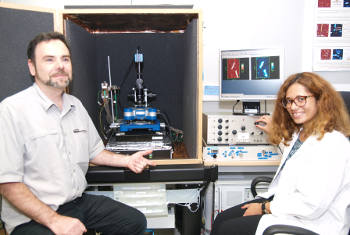JPK Instruments, a world-leading manufacturer of nanoanalytic instrumentation for research in life sciences and soft matter, reports on the application of scanning electrochemical microscopy to study nanometric biostructures by the Demaille and Anne Group in the Laboratoire d'Electrochimie Moléculaire at the Université Paris Diderot, France.
 Dr Christophe Demaille and PhD student, Cécilia Taofifenua, in front of the JPK NanoWizard®-based AFM-SECM set up developed at the Université Paris Diderot.
Dr Christophe Demaille and PhD student, Cécilia Taofifenua, in front of the JPK NanoWizard®-based AFM-SECM set up developed at the Université Paris Diderot.
Drs Christophe Demaille and Agnès Anne from CNRS work in the Laboratoire d'Electrochimie Moléculaire at the Université Paris Diderot as Group Leaders of a research team aiming to probe electron transport and communication in nanometric biostructures.
Their studies are performed at the single nano-object scale using combined atomic force (AFM)-Electrochemical (SECM) microscopy. In this combined microscopy technique, the tip acts as both force sensor and microelectrode. Correlated topography and tip current images can thus be simultaneously acquired. The Group produces their own hybrid AFM-SECM tips from gold microwires.
Dr Demaille says that their approach is unique in that they are using a particular AFM-SECM configuration, they labeled Mt (Molecule touching) AFM-SECM, where the tip comes in direct physical contact with the nano-object to be electrochemically interrogated. Their aim is to localize individual redox active biomacromolecules and probing their activity. This involves redox labelling of the structures of interest and requires both a nanometer range spatial resolution and the ability to measure very low electrochemical currents (in the few tens of femto Ampere range).
The team has previously applied this approach to characterize artificial constructs, like DNA strands on a synthetic support to help understanding the transduction mechanism of DNA electrochemical biosensors. But more recently in a collaborative work with the team of Thierry Michon from INRA, this approach has been successfully used to characterize nanometer sized biological objects such as viruses.1 The use of redox-immunomarking (redox labeled antibody targeting specific viral proteins) allows selective detection of the sought viral proteins since only the immunomarked proteins are seen in the tip current image. The virus topography is obtained simultaneously so that the location of the viral proteins can be resolved with respect to the virus external architecture.
In terms of the future, this type of work can be extended to the evaluation of bioactive nanometric devices mimicking what may be found in plasma membranes or living cells. For instance, viruses may be used as scaffolds to specifically bind redox enzymes.
Talking about their choice of system, Dr Demaille says “We believe our NanoWizard-based AFM-SECM microscope is a promising tool for viral nanotechnology since it uniquely allows the functional characterization of modified viruses. Historically, we started working on early model of commercial AFM which we modified to enable electrochemical measurements. Then we purchased the JPK NanoWizard® II system to specifically work on the "virus" project with a budget from an ANR grant application. The JPK AFM is much easier to handle and to modify, especially with respect to the open access (to the cell) which is not possible with other tools from the competition. We have basically kept the prism and added a wire connected to a home-designed bipotentiostat. The new setup has been implemented in the software. What is also unique with the JPK setup is the presence of a real reference electrode which is the key requirement for this type of measurement.”
Reference
1 Electrochemical Atomic Force Microscopy Imaging of Redox-Immunomarked Proteins on Native Potyviruses: From Subparticle to Single-Protein Resolution; Nault et al; ACS Nano, 2015, 9 (5), pp 4911-4924; DOI: 10.1021/acsnano.5b00952
About JPK Instruments
JPK Instruments AG is a world-leading manufacturer of nanoanalytic instruments - particularly atomic force microscope (AFM) systems and optical tweezers - for a broad range of applications reaching from soft matter physics to nano-optics, from surface chemistry to cell and molecular biology. From its earliest days applying atomic force microscope (AFM) technology, JPK has recognized the opportunities provided by nanotechnology for transforming life sciences and soft matter research. This focus has driven JPK’s success in uniting the worlds of nanotechnology tools and life science applications by offering cutting-edge technology and unique applications expertise. Headquartered in Berlin and with direct operations in Dresden, Cambridge (UK), Singapore, Tokyo, Shanghai (China), Paris (France) and Carpinteria (USA), JPK maintains a global network of distributors and support centers and provides on the spot applications and service support to an ever-growing community of researchers.